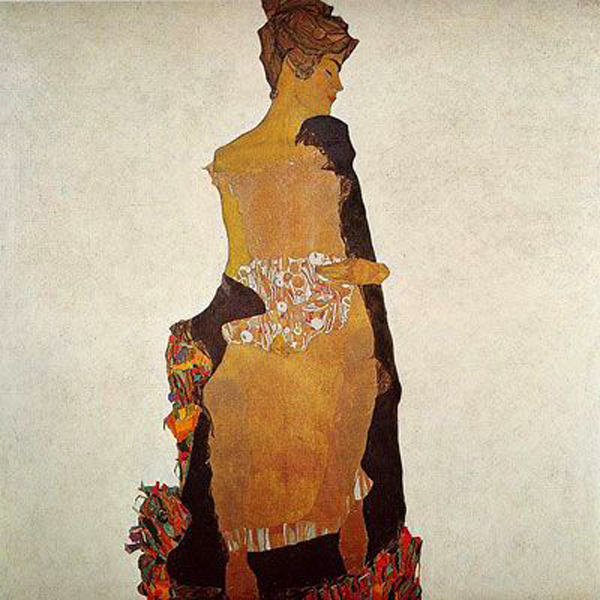by Evelyn Hooven (June 2020)

Portrait of Gertie Schiele, Egon Schiele, 1909
Sonnet 71
No longer mourn for me when I am dead
Than you shall hear the surly sullen bell
Give warning to the world that I am fled
From this vile world, with vilest worms to dwell:
Nay, if you read this line, remember not
The hand that writ it; for I love you so,
That I in your sweet thoughts would be forgot,
If thinking on me then should make you woe.
O, if, I say, you look upon this verse
When I perhaps compounded am with clay,
Do not so much as my poor name rehearse;
But let your love even with my life decay;
Lest the wise world should look into your moan,
And mock you with me after I am gone.
A Note: Rarely anthologized, almost never quoted, this sonnet’s perspective may in our time be strikingly germane. Neither traditional praise of the immortalizing grandeur of poetry nor an implied narrative, it is an action, an oblique quest for a stance or state of mind before the unabating possibility of death.
What follows, in response, is my own poem-meditation. In homage and long-time gratitude, I try it in the Shakespearean idiom of blank verse.
No Longer Mourn: A Meditation
The quatrain-long imperative gives way
To conjecture: the subjunctive mood—
If, perchance, lest it should, perhaps—will prevail.
As the initial thought becomes more sorrow
Than assertion, anxiety shadows
A tentative balance; it is not loss
Of a world vile as its vilest worms,
Cunning in its travesties of mourning,
That stirs anguish, but a protective love
That can neither halt a mourner’s remembrance
Nor mend a process of worldly mockery.
At the verge of being withheld, the incomplete
Gesture, doubt, or conjecture make it possible
To consider the appalling peril
Of one’s total, irremediable absence.
What holds until the end is a Presence.
Here the sheer fact of protective love
And the verse, the lines that convey its fealty,
Are the best of offerings—modest, perhaps,
But the closest in a blemished world
To what is lofty, authentic, and pure.
«Previous Article Table of Contents Next Article»
______________________________
Evelyn Hooven graduated from Mount Holyoke College and received her M.A. from Yale University, where she also studied at The Yale School of Drama. A member of the Dramatists’ Guild, she has had presentations of her verse dramas at several theatrical venues, including The Maxwell Anderson Playwrights Series in Greenwich, CT (after a state-wide competition) and The Poet’s Theatre in Cambridge, MA (result of a national competition). Her poems and translations from the French have appeared in ART TIMES, Chelsea, The Literary Review, THE SHOp: A Magazine of Poetry (in Ireland), The Tribeca Poetry Review, Vallum (in Montreal), and other journals, and her literary criticism in Oxford University’s Essays in Criticism.
Follow NER on Twitter @NERIconoclast







